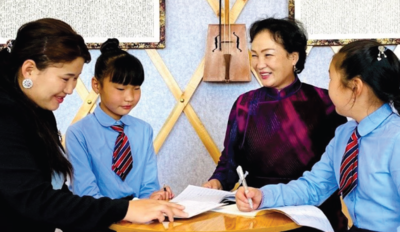Beneficiary Story - Refurbishment of Principal Ch. Khishigmaa’s School No. 65
Background
When I was appointed principal of School No. 65 in 2010, there were more than 3500 children from 3rd, 4th, 26th and 36th sub-district of Songinokhairkhan who studied in three shifts and 82classes. The school’s external and internal environment was poor, especially the 1st block of the school, which had not been renovated since the opening of the school in 1985. All windows were wooden, the school had no paved access road, and no fences. It was not connected to clean water, and it was heated by a boiler. During the winter season, teachers wore thick clothes and boots, and the children had to attend class in their overcoats. 20-25% of children, and 10-15% of teachers were regularly ill during the winter.
The Project
In 2018, I heard the good news that the GIZ and the MUB were beginning to implement the “Energy Efficient Building Refurbishment in Mongolia”. This project aimed to help kindergartens and schools of the capital city to save energy, reduce their building heat loss, and carry out major repair and insulation work. We identified all the existing technical problems and heat loss conditions of our buildings and facilities and forwarded our request to the relevant organisations and officials. Unfortunately, we were not able to get the funding as the budget cost for that year was already high, and our application submission was late.
In 2020, we resubmitted our request, and this time we were able to receive a total of 750 million MNT for our 1st building. With this funding we were able to replace eight doors and 229 windows, improved the 1930m2 roof, performed full insulation and overhaul work of 4056m2 of the facade and 560m2 of the foundation of the building. The renovation and insulation of our school has resulted in energy savings of up to 43%. It significantly reduced our CO2 and fine particle emissions, and the lifetime of our school building has been extended by at least 30-years.
Another beneficial feature of the project was that it provided us with a supervising engineer who checked the quality of work. He also supported us by conducting capacity building training for our support team that consisted of school administrators, teachers, staff and parents. When the support team was completing the monitoring and evaluation process, we realized that the external environment of our school was very polluted, and that we needed to create a habit for properly disposing of our waste.
To address this situation, we used the “parents monitoring and evaluation methodology” which helped us to develop and implement a recycling upgrade training and advocacy plan. For example, we placed 174 bins in classrooms, and 24 bins in corridors. We provided training to 58 groups of parents, and we conducted nine types of advocacy activities.
Impacts of the Refurbishment
As a consequence, the relationship between parents and school administration has greatly improved so that we are all working together towards the same goal. We were very happy as our initiative was also supported by the 3rd sub-district of Songinokhairkhan. In line with this, we are adding to our school policy, legal documents and plans to show our contribution in trying to meet the Global Sustainable Development Goals. For example we are now working together with the residents of our subdistrict to raise awareness, of the importance in sorting out their garbage. As part of this work, we studied the standards of waste sorting procedure, consulted with professionals, and showed a play titled “Garbage Monster” to more than 2100 primary school children, which greatly helped them to learn more about sorting garbage at their early ages. I am especially proud that we achieved all of this together, and now every class within our school sorts their garbage, and this practice is passed on to their families.






















